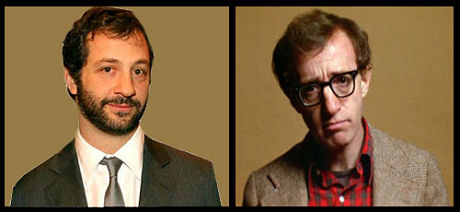After watching Annie Hall last night, Vanity Fair.com’s Julian Sancton is wondering if Funny People is Judd Apatow‘s attempt to similarly veer off in a more grounded reality vein.

Well…obviously, of course, yeah. But it doesn’t flatter Apatow to bring up Allen’s 1978 coming-into-his-own film. Nor is it fair, really, as Funny People is about how a talented but selfish egotist manages to gradually edge toward menschhood after a serious brush with death while Annie Hall grapples with a much more touching and universal theme — i.e., that the reasons people get together tend, paradoxically, to be the same reasons why they break up.
“At 41, Apatow is exactly the same age as Allen was when Annie Hall was released, in 1977, when he was considered as Apatow is today the top comedic filmmaker of his time. And just as Allen did with such goofy farces as Sleeper, Bananas and Love and Death, Apatow amassed enough political capital in Hollywood with The 40-Year-Old Virgin and Knocked Up to convince studios to allow him to spend it all on a more serious passion project.
“In each case, the filmmakers wrote what they knew, what they obsessed about, which happened to be the same two things: comedy and women. Each film gets both laughs and pathos by focusing on the existential angst of a standup comedian, and on his ultimately fruitless efforts to rekindle an old romance. The films actually overlap directly on a few plot points, such as with the smarmy foils played by Tony Roberts and Jason Schwartzman, who, in Allen and Apatow’s films respectively, both sell out by starring in second-rate sitcoms.
And “most importantly, both films stubbornly avoid the happy ending,” Sancton states.
Really? Funny People‘s conclusion isn’t “happy” but it does end on a tone of decency and mutual respect and rapprochement between Adam Sandler and Seth Rogen‘s comedian characters.
Unfortunately Apatow delivers a bummer epilogue at the end of the piece.
“It’s possible, however, that Funny People will be more of a detour in Apatow’s career than a new direction,” Sancton writes. “When I spoke to the director recently about some of the more emotionally difficult scenes in his latest film, he seemed hesitant to revisit that kind of pain anytime soon.
“‘The dramatic scenes were so painful to make that it made me respect people who can do that for an entire movie,’ he told me. ‘Just watching Adam prepare and get in the mindset to make a very difficult and sad scene was almost more than I, personally, could handle. All I thought the whole time was, After this I need to make a really stupid movie. Next time you may say this was the broadest thing I have ever done.'”
Imagine Allen saying the following to an interviewer just before the release of Annie Hall:
“I don’t know…I’m not sure about my creative direction because those dramatic scenes were really rough. It brought back all the stuff I went through with Diane in our real-life relationship. It was almost more than I could handle. I’m thinking I might want to make another Bananas or Take The Money and Run and just…you know, recover from this thing.
“For the last few months I’ve been nursing this idea for a widescreen black-and-white film called Manhattan — another difficult-relationships film — but I’m now thinking it would be better to just relapse back into a silly comedy and…you know, have a good time and make people laugh. I mean, I’m an entertainer, right? And that’s what people want me to be.”
